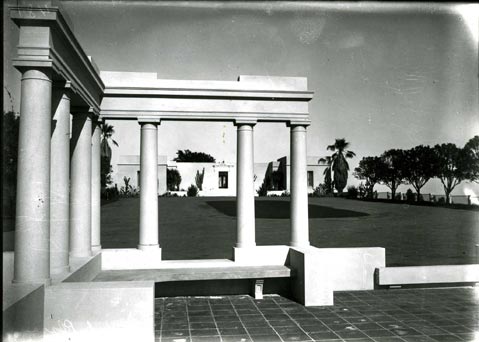Center for the Study of Democratic Institutions
Santa Barbara's Prominent Think Tank

For almost 30 years, Santa Barbara was home to one of the most prominent think tanks in the country. Founded in 1959, the Center for the Study of Democratic Institutions opened its doors to scholars from around the world “to clarify the issues involved in maintaining a free and just society : and to advance the understanding of those issues by promoting discussion of them among the American people.”
The center had its origins in an organization established at the end of 1952, the Fund for the Republic, which received $15 million seed money from the Ford Foundation. The fund disbursed monies to support studies of public concern such as school and housing integration, academic freedom, national security, and the role of the media in society. In 1957, the fund inaugurated the Basic Issues Program, which gathered together consultant groups to study a variety of U.S. public and social institutions. In the space of two years, some 300 scholars participated and more than 50 papers were published. The purpose was not to necessarily solve problems or arrive at definitive answers, but present information to encourage lively and informed public debate and discussion.
The next step was to create a residential center for a core of full-time participants and invited experts to spend extended periods of time examining the issues at hand. In 1959, the fund purchased an estate on the South Coast to be the headquarters for the new Center for the Study of Democratic Institutions. Robert M. Hutchins became president.
A native New Yorker, Hutchins graduated from Yale Law School in 1925 and two years later, at the age of 28, was a dean at the school. He went on to the presidency of the University of Chicago and, by 1954, was the chief executive of the Fund for the Republic. He then moved on to the center. Hutchins was an educational experimenter; he allowed worthy students to enter the University of Chicago after only two years of high school, granted college degrees to some after two years, and abolished football at the school. Nominated for a Nobel Peace Prize, he was a lightning rod for criticism in some political circles; he opposed U.S. involvement in World War II and later was sharply critical of the U.S. role in Vietnam.
The center settled into the former Frederick Peabody estate, Solana, high on a hill off Eucalyptus Hill Road. The ideal was the academy of ancient Greece, where problems could be resolved through dialogue and discussion. The center was a haven where participants could examine issues unfettered by outside constraints. Among the early participants were economist John Kenneth Galbraith, author Aldous Huxley, historian Allan Nevins, and Pulitzer Prize-winning journalist Harry Ashmore. Later participants included Henry Kissinger, Supreme Court Justice William O. Douglas, and Martin Luther King Jr. The center was criticized for its perceived liberal bias; many viewed Solano as literally an “ivory tower.” The center produced hundreds of reports and papers through the years and some, such as treatises on medical malpractice and on illegal immigration, to name just two, had significant impact.
By the mid 1970s, funding had become a major concern. In 1975, a personnel shakeup led to major layoffs and a lingering bitterness. Parts of Solana were sold to keep the center afloat. In 1979, UCSB began its sponsorship of the center, which moved to campus. The center continued to publish papers and attract scholars to its daily round-table dialogues, but operating costs became a drain on university coffers.
In 1988, the center merged with the Institute for National Strategy, based in Los Angeles. The center’s South Coast connection had come to an end. For almost 30 years, the Center for the Study of Democratic Institutions had promoted “the possibility of maintaining faith in democracy and making it effective in an industrialized, scientific, bureaucratic, polarized world.”



